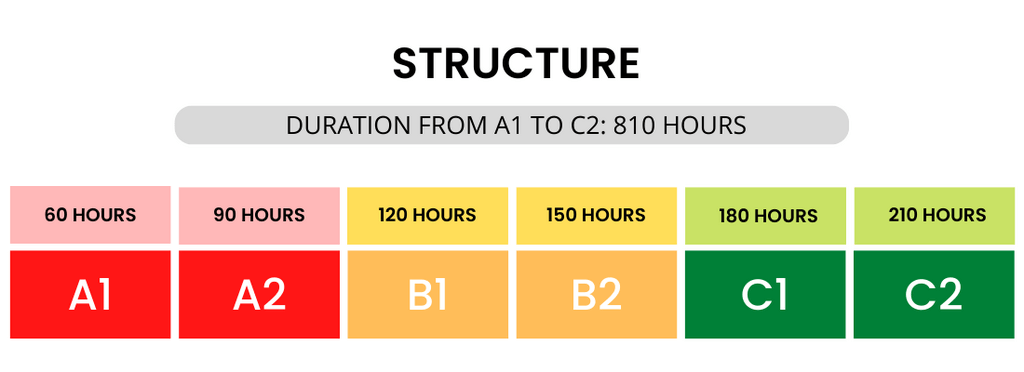Goals by level

A1 - BREAKTHROUGH
- To complete this level it is necessary to take a minimum of 60 hours according to Instituto Cervantes standards.
- Students have a very limited rehearsed and lexically organized repertoire of phrases used in concrete and predictable situations.
- They can interact in a simple way, as long as the interlocutor collaborates.
- They have resources that allow them to satisfy immediate needs related to everyday situations such as asking for very specific things and finding out about their location, asking where they want to go, giving information about personal aspects and dealing with quantities, prices and schedules.

A2 - WAYSTAGE
- To complete this level it is necessary to take a minimum of 90 hours according to Instituto Cervantes standards.
- Students are capable of handling a limited repertoire of simple linguistic and non-linguistic resources, such as basic syntactic structures (including memorized phrases or formulas) and very general knowledge about social conventions and cultural references of the Hispanic world.
- They use their skills, abilities and attitudes to compensate for their communication difficulties.
- They communicate in an understandable and clear way, even if their foreign accent is evident and, in rare situations, interruptions and misunderstandings occur.
- They function in everyday situations of basic survival: they ask and respond to requests, obtain basic information in stores, banks, post offices, means of transport, etc., and acquire the goods and services they need.

B1 - THRESHOLD
- To complete this level it is necessary to take a minimum of 120 hours according to Instituto Cervantes standards.
- Students are able to take advantage of a wide but simple repertoire of vocabulary, structures and formulas learned.
- They put into play the general knowledge of the Hispanic world (cultural references, norms and conventions of a sociocultural nature) that they need to function in the different transactions in which they participate.
- They communicate adequately in a neutral register, although with enough flexibility to adapt to different situations.
- They express themselves with reasonable accuracy, although they hesitate or pause to think about what they are going to say and make mistakes (especially pronunciation), especially in unforeseen and tense situations.
- They know how to ask someone to clarify or develop what they just said.
- They are capable of carrying out the transactions that are required in the organization of a trip or during its development or in less common situations in shops, car rental agencies, post offices, banks, etc.
- They are capable of making complaints and recounting details of unforeseen situations (thefts, accidents, etc.).

B2 - VANTAGE
- To complete this level it is necessary to take a minimum of 150 hours having previously accredited the previous levels according to Instituto Cervantes standards.
- Students have the necessary linguistic and non-linguistic resources to participate in communicative exchanges with a sufficient degree of fluency, precision and naturalness so that their interlocutors do not have to make a special effort.
- They have a level of awareness of the language that allows them to avoid errors that give rise to misunderstandings and use enough resources to avoid situations of ambiguity and clarify what the interlocutor has meant.
- They use a broad linguistic repertoire, sufficient to express themselves with arguments and nuances, without major formulation errors and with clear pronunciation.
- They consider the effect of their comments and take into account both the communication situation and their interlocutors to adapt the register and the level of formality to different circumstances.
- They have sufficient linguistic ability to outline the details of a problem, present claims and resolve conflict situations using their ability to argue and use persuasive language.

C1 - EFFECTIVE OPERATIONAL PROFICIENCY
- To complete this level it is necessary to take a minimum of 180 hours having previously accredited the previous levels according to Instituto Cervantes standards.
- Students have a repertoire of linguistic and non-linguistic resources that is broad and rich enough to communicate fluently and naturally, almost effortlessly.
- They have an extensive and precise lexical repertoire that allows them to express nuances of meaning, eliminating ambiguities and confusion.
- They communicate fluently and spontaneously, with little hesitation, even in complicated situations or with adverse circumstances of noise or interference.
- They use the appropriate register for each type of situation and operate coherently and consistently in different registers (familiar, neutral, formal, solemn, etc.).
- They resort to the skills, abilities and attitudes that are required to carry out delicate transactions or those that have a certain degree of complexity, such as making arrangements by phone, carrying out banking operations of a certain complexity, solving breakdowns following telephone instructions, etc.

C2 - MASTERY
- To complete this level it is necessary to take a minimum of 210 hours having previously accredited the previous levels according to Instituto Cervantes standards.
- Students have linguistic and non-linguistic resources, as well as sufficient declarative knowledge to deal with all kinds of situations, including unforeseen ones, and the complications in which they may be involved.
- They express themselves with precision, propriety, and ease in the use of the language and are capable of conveying subtle nuances of meaning.
- They function smoothly in different registers and have a good command of idiomatic and colloquial expressions.
- In particularly delicate or complex situations they know how to circumvent communication difficulties with such skill and discretion that the interlocutor barely notices them.
- They have sufficient linguistic ability to understand the implications of a contract or an administrative document, inquire about areas of work other than their own, make nuanced assessments of a proposal, describe non-visible symptoms of illness, deal with unusual professional situations, etc.

